Connecting Fairfax City's Past and Present to Build a More Equitable and Inclusive Future
On July 12, 2022, City Council voted to change the names of 14 streets as recommended by the Stakeholder Advisory Group. Watch the meeting.
UPDATE July 12, 2022: City Council voted to change 14 street names. Watch the meeting. If you would like to submit names for consideration, please complete the survey.
Connecting Fairfax City for All
The City of Fairfax recognizes there is strength in diversity and acknowledges the need for a broader community conversation around the issues of racial and social equity, systemic racism, symbolism, and identity.

Evolving views about who and what should be memorialized in public spaces and on public land present an opportunity for the City of Fairfax to examine its nomenclature. Confederate-related street and place names, historical markers and monuments, and elements in the city seal will be discussed in the context of how these symbols reflect the City Council’s goals of inclusivity and building community.
City residents are invited to participate in thought-provoking conversations that connect current realities with the city’s historical past. Ultimately, through a series of listening and learning opportunities, the goal is to connect the present to a more equitable and inclusive future for all city residents, businesses, and visitors.
“This initiative, endorsed by the City Council, holds great promise for our city residents to engage with each other with respect, compassion, and an openness to learning and gaining a greater understanding of each other,” said City of Fairfax Mayor David Meyer. “This is an opportunity for all of us to discern what actions we may take to create a preferred future that is inclusive and more just and equitable.”
Partnership with George Mason University
To accomplish this work, the city has partnered with the George Mason University Jimmy and Rosalynn Carter School for Peace and Conflict Resolution. Working with the Carter School, the city has outlined a process to listen to community voices, engage the community in learning sessions and structured, facilitated discussions, and will form a diverse working group to make recommendations on action items and identify areas for further community discussion. City Council will consider the recommendations in 2021 before making decisions regarding the city’s nomenclature.
Please explore this project site, drop a pin on the map, share your ideas, tell your story, or leave a comment. Click on the social media icons to share with others.

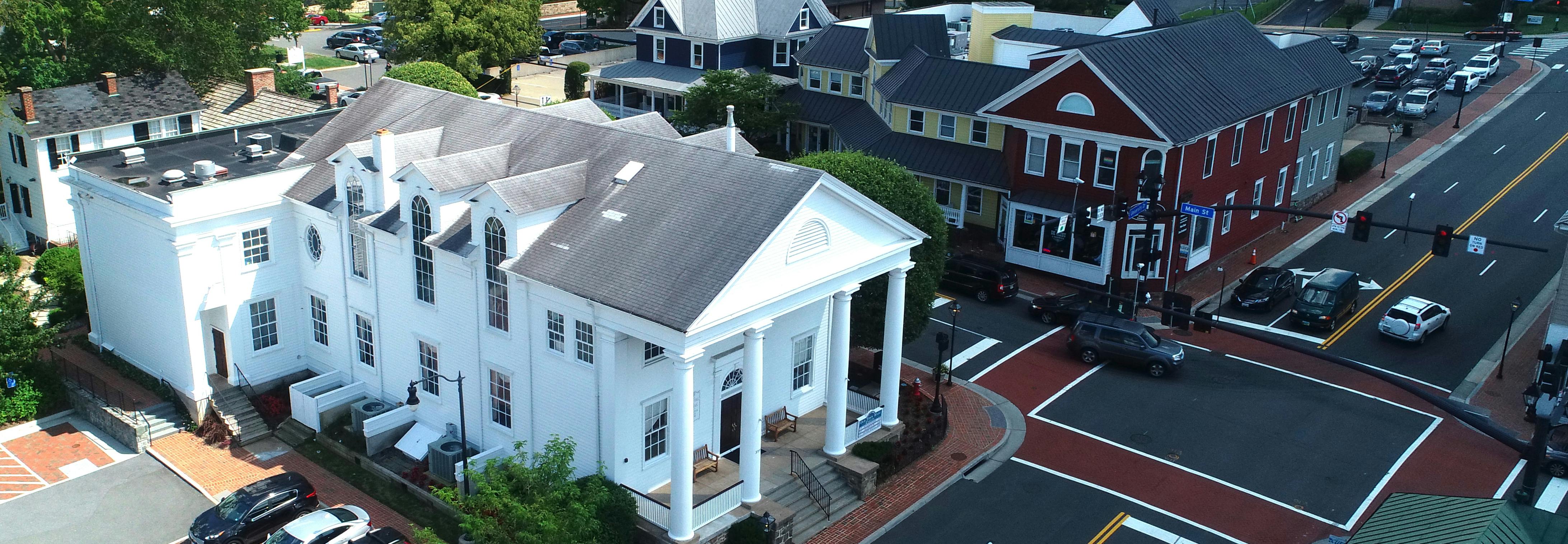









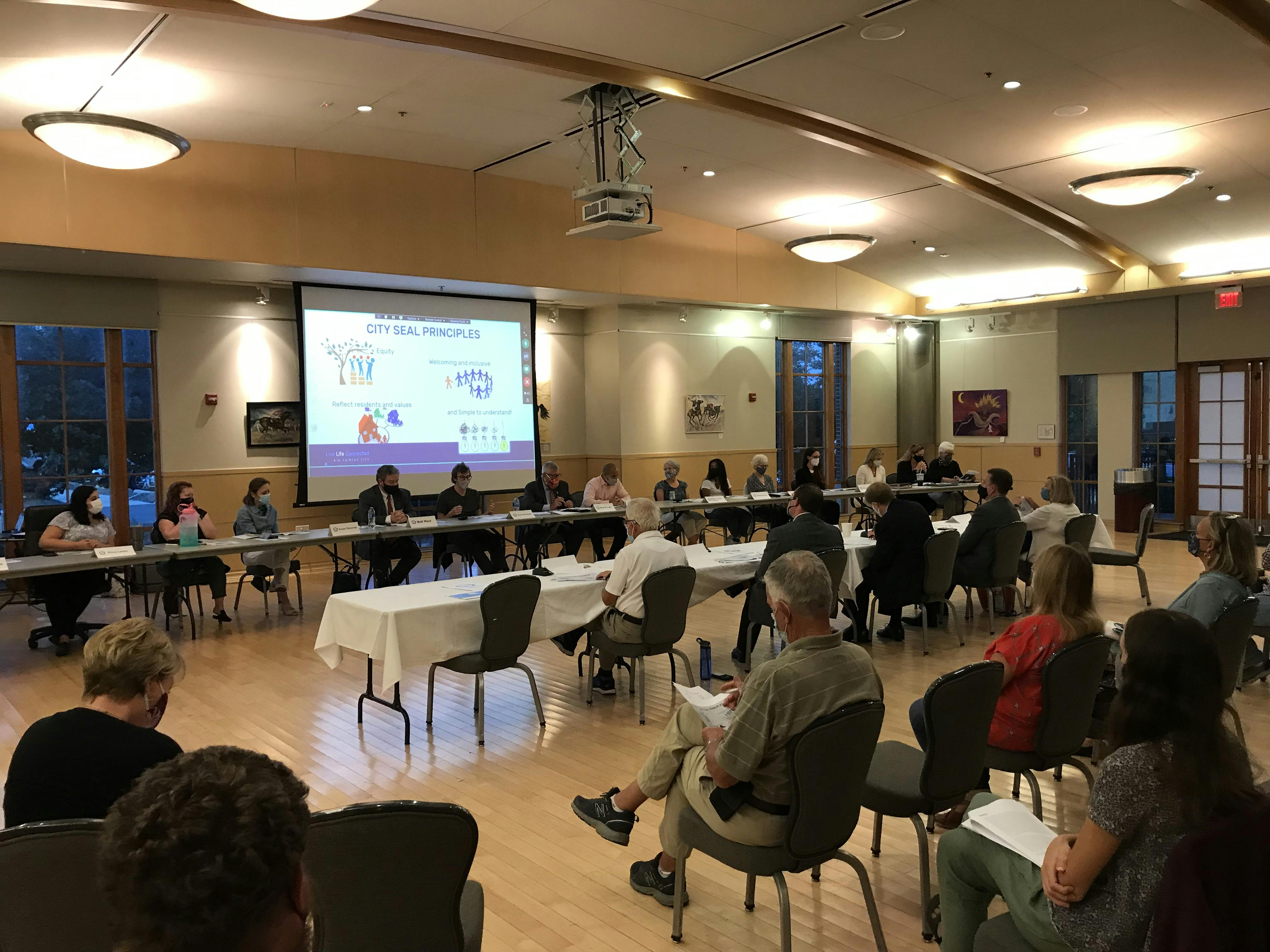
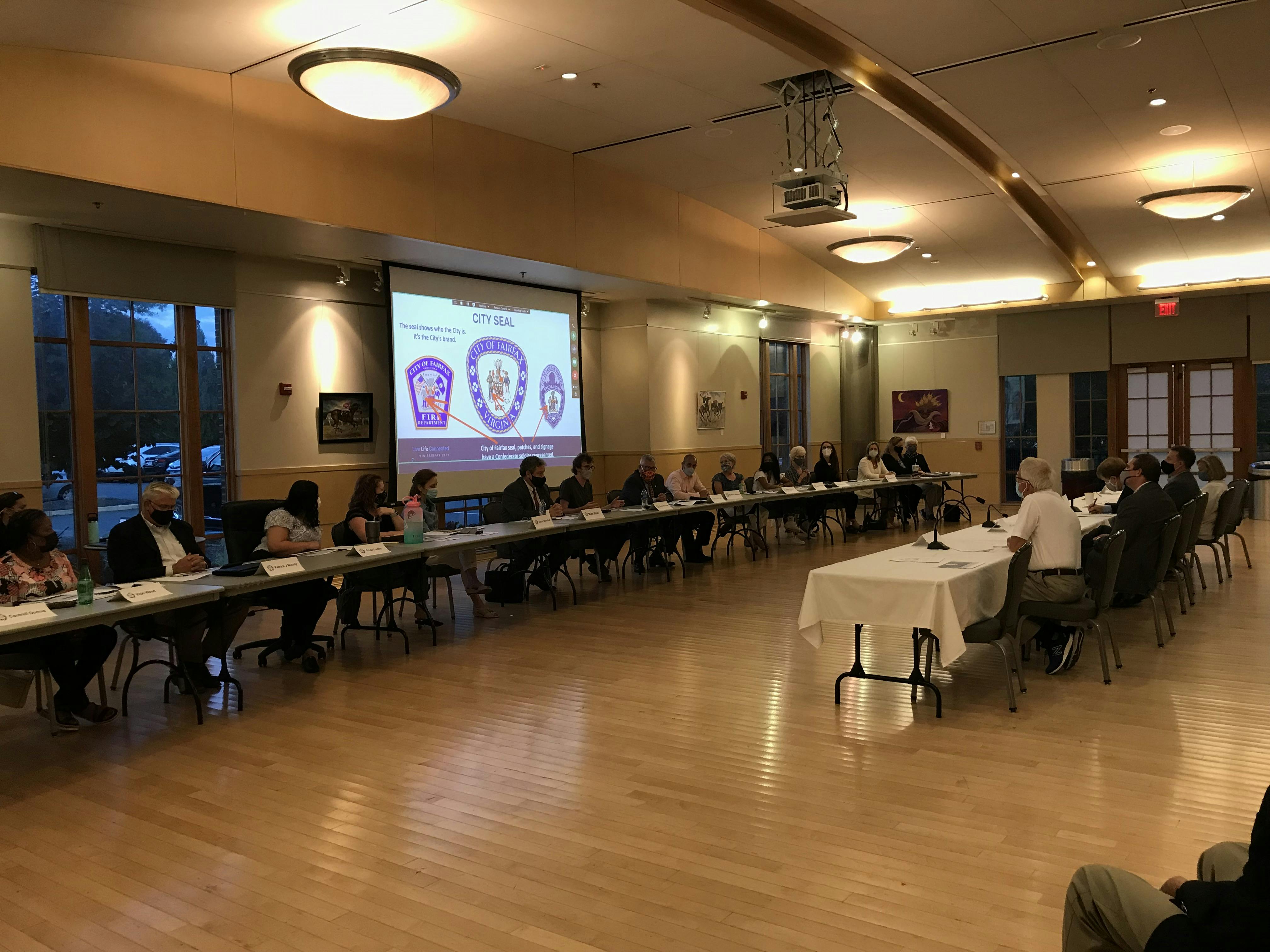
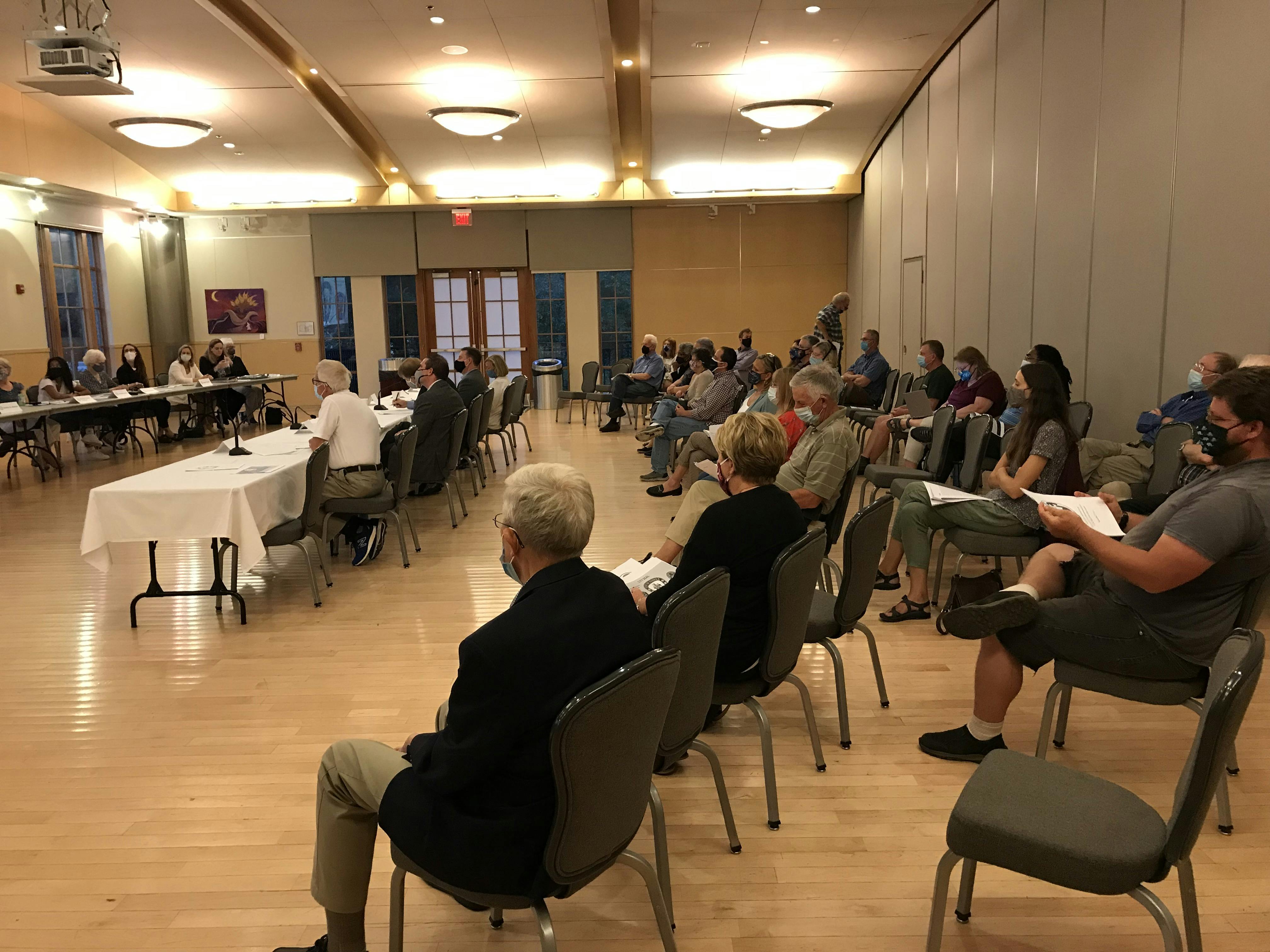
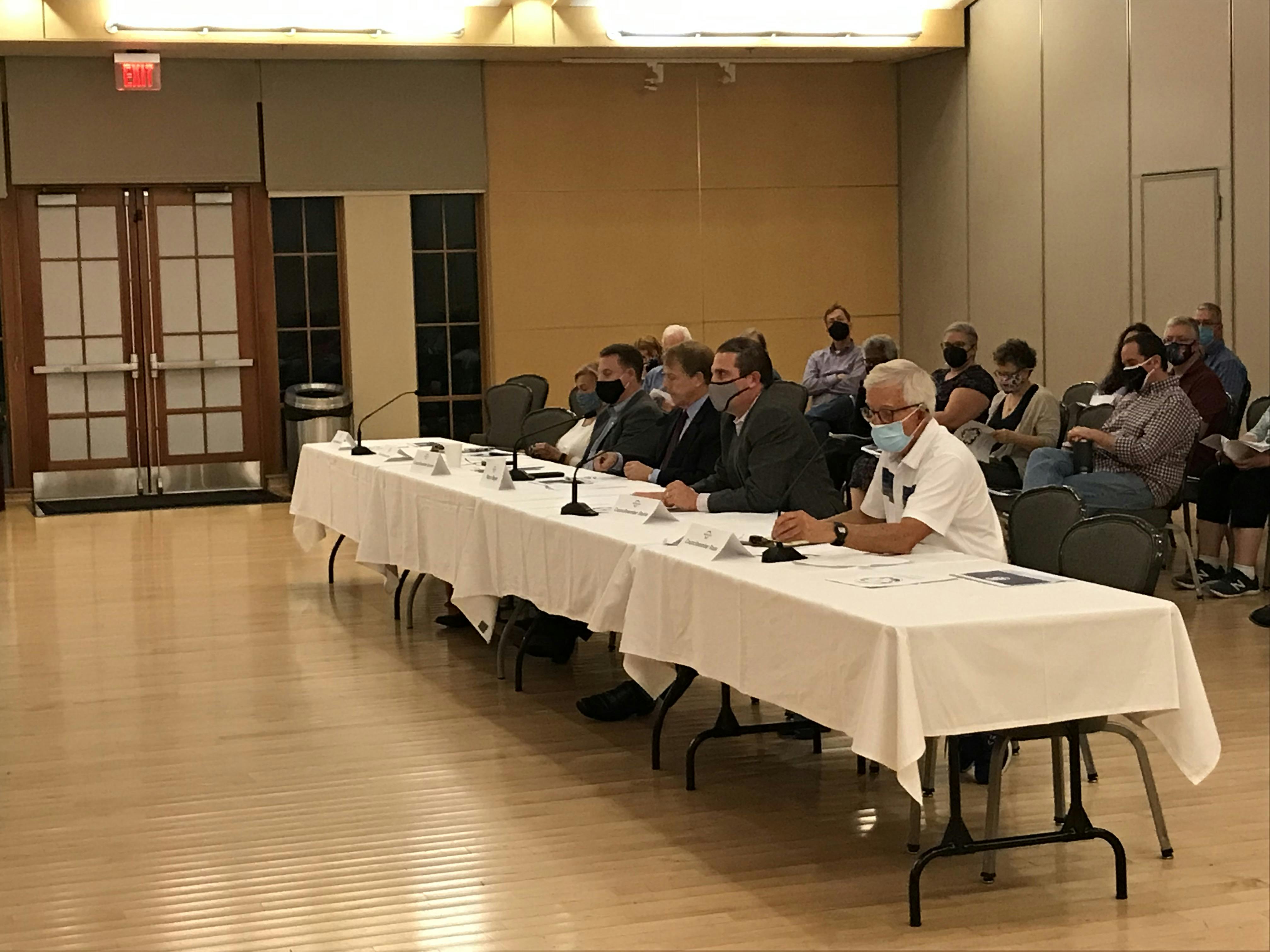
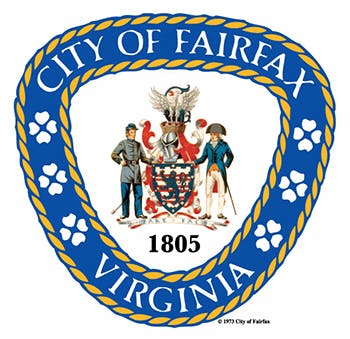

I do oppose changing the name of many of our city streets for many different reasons. Has anyone taken into account the personal cost per resident to make these changes in, for example, they're legal documents? For some, it's not insignificant. Does the city plan to address or get feedback from home owners who are not part of a community association (the only way many of us are finding out about these changes?) Also, how about our elderly home owners who may find it burdensome to make all of these changes (e.g., getting to the DMV, courthouse, etc.?). What is the tax burden to make these name changes when so many of our city streets and utilities are in poor condition and go unaddressed. Even worse, some of the name changes in our neighborhood want to change the name of streets like "Traveler" (because it is believed it was named for Robert E Lee's horse, when the name of the horse was actually "Traveller" (look it up.). However, the powers that be have excluded street names like "Atlanta," which some could argue was a huge hub for the slave trade but proponents of these name changes live on that street. Where is the equity in these name changes?
I'm relieved to see real progress towards equity. I grew up in Fairfax City on a street with a particularly problematic name and attended a high school who's mascot, were he real, would have happily tortured me and my family for his gain.
I flinch as I teach my daughter the names of locations near where she lives. Listening to her repeat them, not understanding their larger meaning and the history behind them. I still remember how it felt to learn as a teen/young adult that these streets that carried so many of my favorite childhood memories were named to honor people that would have considered me less than human. How it felt to realize that I had lived and grown up among people who never thought twice about it. Turns out some of them have and are doing something about it. Let's make a Fairfax that represents and honors all residents.
I see that the city council has a work session scheduled for Feb 1. I am glad it's on the agenda and not stalling out. I am eager for action to rename the most problematic streets (Reb, Plantation, and Confederate). Thank you for keeping it moving!
I appreciate the concerns about the importance of history, but it's ridiculous to claim name changes=erasing history. The history will still be there! History exists even when there is not a street named to commemorate it! Here's another part of history - many of the street names, like Lee Hwy and Old Lee Hwy, were named during the Jim Crow Era to CELEBRATE the Confederacy (traitors) and those who fought to keep slavery alive. These names were used to celebrate segregation, racism, and oppression. There are many reasons people want to keep these names - they're names they know, they feel this is no big deal, etc. That's understandable. But if we're going to strive for greater equity, we need to think about how people who experienced or whose ancestors experienced this discrimination perceive and process these street names in their own community. A street name is a celebration of a person. Perhaps that's why there's so Lincoln or Union or Grant Streets here. When these other streets were named, people we not celebrating history, they were celebrating the people in history they wanted to praise.
We have already changed the names of schools and some streets. Let's not go overboard! We can't change history. It is time to focus instead on the need for real changes in our City in terms of economic equity.
With all of this discussion over name changing it seems like we're smoke-screening the more important changes. Where are the real discussions surrounding equity as it relates to the City of Fairfax closing achievement gaps, expanding housing options, reforming law enforcement?
As a long-time resident, I am opposed to Mosby Woods' neighborhood street names being changed; currently - without changes - they carry a balance of historic context. If a sign posted at our neighborhood entrance is necessary to contextualize further (explain the historic street names to the unknowing or uneducated in relation to how we have chosen to live in response to the historical knowledge of slavery in our country's past as families and individuals in a neighborhood today and over the past 50+ years since the names were installed), let's spend limited monies there. By changing the proposed street names we'd be endorsing an effort which I believe should be called "erasing local history," not to mention a slap in the face to us long-timers with the upheaval of erasing our own family's personal history of doing life on these streets with a no-racism-tolerance for how we relate to others in our neighborhood and City and beyond. Instead, let's focus our personal and City resources and energies surrounding “systemic racism” by truly addressing any remaining elements of our racist past with real reform as suggested by another City citizen: "closing achievement gaps, expanding housing options, reforming law enforcement. Nobody opposing name changes in our City has racist motives for doing so, despite some bullying comments to that effect from some of the responses."
I am a Mosby Woods resident and opposed to the name changes being proposed. We should focus our efforts and funds on other pressing matters. In addition, I am opposed to the name changes as it will cause me additional paperwork for me. We have to learn from history not erase it
I have been a resident of Fairfax City since 1965 and graduated from GMC in 1969. I love the City because of all the historical attributes it displays. I 100% disagree with all the removal of our historical names and landmarks. We cannot change history, good or bad. We can certainly learn from the bad things and learn from their life lessons, however they cannot be erased and should not be eliminated from our history.
Change is inevitable. People change, places change, time change....Nothing is static. Please consider what we want to be as society in the coming decades, centuries. Let's avoid some names and symbols if that hurts anyone's feelings. Let's create an inclusive environment. The city becomes more diverse in its population like many other locations in the Northern VA; and this trend continues to be the reality going forward. Let's renew the energy to the coming generation. Viva - Fairfax Forward!!
Please do not change Lee Highway and Old Lee Highway just to appease some PC folks. These names are part of history and history cannot be erased. Fairfax was deeply involved in the confederacy and to change some street names won't change that.
It shames Fairfax City to have street names such as Rebel and Plantation in Mosby Woods. What horrible commemoration of slavery and racial oppression. On the official flag of Fairfax City is a confederate soldier, commemorating the first confederate soldier killed in the war. What a shame that Fairfax City commemorates this on its official flag.
I don't understand the desire to "remember Confederate history."
They lost! They were traitors to the United States!. They surrendered!
Is that your heritage? If it were mine, I'd want to forget about it.
I feel some sympathy and respect for the Stakeholders Advisory Group (SAG), which produced a list of Confederate-related street names for elimination. The respectful and thorough process was good fire-prevention, because the issue of nomenclature is inherently divisive.
Still, there are problems in the recommendations. While it was a relief to see the group aim only at the Confederacy and eschew the fashionable hostility to slaveholding Founders like Mason and Jefferson, the project is full of contradictions and inconsistencies:
1. Mosby wasn’t a decision-maker, merely a cavalry unit leader who repudiated his treasonous derring-do, was pardoned, and went on to leave a distinguished and patriotic legacy, much like Sidney Lanier and Mark Twain. 40 years of service to the United States after four years of rebellion should count for something. (Note: Lanier was excised as a school name; Twain was not.) The rationale is much sturdier if one targets leaders like Davis, Lee, and Jackson.
2. Mosby was a raider and a ranger, which I suppose is why “Raider” and “Ranger” are on the Index. But Mosby was also “Cavalry,” which is not condemned. Union generals Custer and Sheridan were also raiders and rangers; the terms in context are part of a general war theme in Mosby Woods, along with “Musket,” “Armory,” “Scout,” and a few others. Several city residents, by the way, wanted to eliminate the war-themed names entirely, as offensive to peace-loving sensibilities.
3. The group found that “Pickett” and “Old Pickett” were named not for Confederate general George but rather for his descendant, lawyer Charles. But who’s going to know that? Most who see only the name “Pickett” will wonder why this Confederate name was given a pass.
4. “Stoughton” is not on the list, nor deserves to be, presumably because he was a Union general. But he is street-named and known only for being captured by Mosby, so that theoretically, his name recognizes a successful Confederate raid.
5. Many respondents have insisted that Mosby Woods, as the biggest concentration of Confederate-related names, is somehow a celebration of rebellion, a Lost Cause nostalgia trip. Running down the list of names, however, refutes this notion. The specific “mentions,” when not neutral military terms, are decidedly weighted toward the Union (e.g., the battles). The entire impression left by the names was something like “this war happened; it was an enormous event in the history of Virginia, the United States, and the world.” It would be strange indeed to leave unmentioned the losing side in the conflict; we would have an absurd neighborhood of bowdlerized history. No wonder some people wish instead to default to faux-pastoral trees and bushes, or insipid abstractions like Unity Street or Equity Lane.
6. The vagueness and sneaky implications of words and phrases surrounding SAG’s discussion reveals a disposition to weight the debate toward censorship. Consider:
—“evolving views”. . . .those for “change” (another lightweight word) are more advanced.
—“connect to a future more equitable and inclusive”. . . .implies that those who oppose nomenclature overhaul are reactionary and opposed to social progress.
—“systemic racism”. . . .a descriptive term applied to racial disparities, attributed to racial animus. Given the remarkable moral development of our society in my lifetime, I see white hostility toward non-whites as an extremely marginal and spent force, though the “overhang” (President Biden’s word) of our racist past necessitates reform: closing achievement gaps, expanding housing options, reforming law enforcement. Nobody opposing name changes in our City, from all that I’ve read and heard, has racist motives for doing so, despite some bullying comments to that effect from some of the responses.
7. Many of us have wondered what this nomenclature fuss is all about, when it wasn’t on the horizon even a few years back. My theory is that there has emerged a longing for “emotional safetyness,” the view that the expression of some views (or public acceptance of the mixed legacies of history), is so abhorrent and upsetting that the psychological damage inflicted on the auditors pre-empts the right to speak (e.g., deplatforming college speakers with conservative, moderate, or even insufficiently liberal views; avoiding the teaching of Huck Finn; cancelling adults for immature utterances in their teens). Thus, the citizens of Falls Church City cancelled George Mason and Thomas Jefferson by appealing to the distress caused to minority youth by the names of slaveholders at the entrance of their schools. The proper response, in my view, to objectionable speech or morally mixed (always! In all countries!) history is more speech, a “pluribus” of viewpoints. I like the idea of “contextualization,” the whole story of a historical legacy; I think it is not a favor to our youth to exile our hero-villains to museums and history books, far away from the casual contact that leads to questions, interesting stories, and engaging debates. George Mason University, for instance, has handled well its namesake’s mixed legacy.
8. The Falls Church episode has one suggestion for us, however. The School Board there commissioned a widely distributed and narrowly focused survey, obtaining the opinion of a wide swath of the citizenry on the single question of banishing the Founder’s names. The company the Board hired, Insight K-12, found that the community was against the change, by a 2-1 margin. The Board voted unanimously to effect the erasure anyway, strenuously justifying their good intentions (a case of “God plus one is a majority”). Cancelling the Founders who gave us the Declaration and the Bill of Rights, however, just made them look silly.
9. I do believe though that we should follow Falls Church with a survey, advisory only. Our community is made up of more than the SAG, and the SAG would serve us well to provide us a referendum-style gauge of public sentiment. It might be useful for the City Council to know if they vote with or against the majority view.
I disagree that street names are always chosen to honor someone or something. Often they are just chosen to go along with a theme, such as poets or trees or art. In the case of MW they were chosen with the theme of the Civil War. They are not honoring one side or the other. That being said, if a street name fairly consistently evokes a negative reaction, such as confederate, reb or plantation, then I can see a rationale for changing it. What I don’t agree with is spending tax payer money and causing significant disruption to residents and businesses because an extensive investigation was required to come to a name change recommendation. If you have to do specific targeted research to decide that you should be offended by a street name then it should not warrant the money and effort required to make that change. Most of the other streets, not named Lee, Stonewall or Mosby, that are recommended for change (Ranger, Raider, Scarlet, Traveler and even Singleton) have common everyday usages that do not have any negative connotation and therefore should not be included in the renaming process. This process should work to address the few specific names that, in and of themselves, illicit a significant negative reaction. But it should also be a priority to create as little disruption and cost to our city residents and government as possible.
I'm really not in favor of validating the negative connotations by removing things that were historical. And I find it sad that everything has to be changed, renamed, and rebranded as so much is now put into turning words into negatives. Many terms that were innocuous have now been permanently associated with negativity and we have allowed that to happen as society. I personally do not associate Rebels with the civil war but James Dean - more like a mascot of power. And Antietam is an Algonquin word for swift-flowing stream - the Antietam civil war battlefield is in Maryland not here. But if that is what makes folks happy then go at it, but for the love of everything, do not turn the street names to a business name as that can turn sour if the business is caught for fraud (I don't want to live on Amazon Prime street) and please no more Justice, Freedom, Liberty names or new people's names that would upset others as that is so in your face in the opposite direction. I suggest more neutral items like one other poster recommended - How about names indigenous to the area like naming the streets after the waterways, animals, or nature like grassy run, or redwood court, oak street, blue ridge drive, rabbit run, red fox lane, spotted fawn drive, etc. . But this renaming will never stop if we don't go neutral and will it ever stop as we are so inclined to keep taking words and using them negatively because it was clever but then turned permanently negative. So are we erasing history by doing this? When will Fairfax, George Mason, Mason Neck, etc. all be changed? I happen to like the name of our city ...but it will eventually be associated with only the negative side of its history and we have erased so many words as negative now so why not. But please not another person's name or justice or liberty or freedom city. While you are at it get rid of Malone Court as I am offended by boxing and its stupid nonsense brutality. Lastly, the street signs and statues should not be removed until you have a museum to place them in as they then belong as part of the history of our town and our country - not as something to fear but to learn from so we never repeat it again and allow generations to learn what happened and how far we've come and improved.
As someone that lives in the city, I can say that the reverence for rebel history is a bit off-putting. It feels militant, like the city is looking back too much to a short period of time in the city’s past. There is almost nothing about the farms that used to dominate the area, or the people that lived here before the city was created, so people that say we are erasing history, this is already not representing the city history. I would like to see the civil war and slavery related names changed to something better reflective of who we want to be going forward, and more inclusive of the past to include stuff not related to war and oppression.
Maybe have more streets names after the plants and animals found in our area, or the activities that we do currently. There are no plantations in the city, maybe offer the nearby business parks the chance to pay for the streets to be named after nearby current major businesses or industries. Use census data from our city to name some streets after common professions in the city - programmer way, cashier place, doctor row, etc. Have themes related to learning such as residential areas named after school subjects - geometry lane, English street. Have common activities included - jogging square, squash lane, pickleball road.
Do not change names.
Do not remove statues.
Do not remove the past to hail in the new brighter kinder gentler future. Because folks if you have notice the 'now' is just as much a struggle as humanity has had in the past.
Participate in the future by nameing new streets with names you like.
Don't like the narrative that a statue represents. Then build a second statue with a different narrative.
Feel that plaque you reading is not representative of both sides of an issue, then put up a second plaque showing the different view.
By removing and changing these names, symbols, and narratives you are removing tools by which future generations will debate and learn from their discussion about them.
Once out of site out of mind happens then we are doomed to repeat our past.
With the way our education system is going we will be lucky if anyone knows or recognizes the truth through books. So without living in Fairfax City on Plantation Ln and going to George Mason University would someone be able to question what each of those nouns meant in the context of our world, our lives, our existence?
No Black family should have to chose between living in a great neighborhood and an address that makes them feel less than. And no family living on these roads should get used to seeing these words everyday and having them be normalized as okay or right.
As a black resident and home owner who has lived in Fairfax City for a number of years, it is heartening to read the comments from white allies talking about changing the names of confederate streets/roads. And then there are others, like the commenter, Amistad — oh, the irony of that chosen screen name — who wants to know how changing signs will improve black lives and uplift minority neighborhoods.
Amistad, I can tell you personally that having those signs changed will improve MY life. This discussion is about making people who are already small in number, and who are often the recipients of casual and overt discrimination, prejudice, and racism, feel welcome across the city. It’s also about the actions a city can take to reconcile its past even if no one notices, and even if blacks or other POCs don’t live in the affected areas.
I can also say, there is zero appeal for me to live and raise my mixed race, black-passing children on a street called “Plantation.” I would not ever feel welcome living in or visiting places that relish in the glory of the old war, or honor soldiers who fought to preserve the institution that enslaved my ancestors. Amistad, you also minimize the issue by calling the changing of the street names “cheap symbolism.” To that I say: Symbols matter. If they didn’t, why are some people on this platform and elsewhere across the country working so hard to preserve them? So much in life is about messaging (and power). Therefore, for me, some of the central questions around this issue are: What kind message do you want to send? And do you care about the message that is currently being sent, intentional or not?
The legacy of slavery and racism in this country reaches far and wide. This discussion isn’t about improving minority neighborhoods. That is a real issue that must be examined and addressed in its own unique way. However many wonderful aspects of this state there may be, the reality is that Virginia has a challenging history steeped in racism (And I say that as someone who is originally from the deep, Deep South).
Signs are just the tip of the iceberg. But the story of Virginia isn’t written in stone, and for those who are awakened to the truth of racism, and who call themselves allies and justice seekers, more needs to be done. We all must operate within our sphere of influence. If you live in Fairfax City then this is one area where you can make a difference. Helping to change these signs is one small way to do that.
I in no way condone "erasing" history. There are places where history can and should be preserved and remembered so that we can learn from it and do our best not to repeat it when it tells of horrors past. Those places are museums, not street signs.